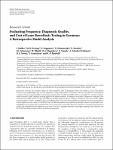Evaluating frequency, diagnostic quality, and cost of lyme borreliosis testing in Germany: a retrospective model analysis.
Müller, I.
Freitag, M. H.
Poggensee, Gabriele
Scharnetzky, E.
Straube, E.
Schoerner, Ch.
Hlobil, H.
Hagedorn, Hans-Jochen
Stanek, G.
Schubert-Unkmeir, A.
Norris, D. E.
Gensichen, J.
Hunfeld, K.-P.
Background: Data on the economic impact of Lyme borreliosis (LB) on European health care systems is scarce. This project focused on the epidemiology and costs for laboratory testing in LB patients in Germany. Materials and Methods: We performed a sentinel analysis of epidemiological and medicoeconomic data for 2007 and 2008. Data was provided by a German statutory health insurance (DAK) company covering approx. 6.04 million members. In addition, the quality of diagnostic testing for LB in Germany was studied. Results: In 2007 and 2008, the incident diagnosis LB was coded on average for 15,742 out of 6.04 million insured members (0.26%). 20,986 EIAs and 12,558 immunoblots were ordered annually for these patients. For all insured members in the outpatient sector, a total of 174,820 EIAs and 52,280 immunoblots were reimbursed annually to health care providers (cost: 2,600,850€). For Germany, the overall expected cost is estimated at 51,215,105€. However, proficiency testing data questioned test quality and standardization of diagnostic assays used. Conclusion: Findings from this study suggest ongoing issues related to care for LB and may help to improve future LB disease management.
Files in this item
No license information

